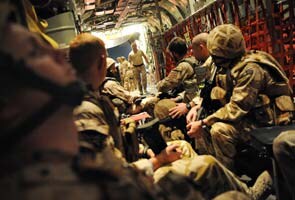
Washington:
India and Pakistan fear that any instability in the war-torn Afghanistan following the withdrawal of US troops could result in "surplus terrorism" in both the countries, a top US official has said.
At the same time he said that the US believes both India and Pakistan will play significant roles in Afghanistan in the coming years.
"I think both Pakistan and India will play and ought to play very important, significant roles going forward in Afghanistan" said Peter Lavoy, Acting Assistant Secretary of Defence for Asia Pacific Security Affairs.
"There's a fear in India that there will be what is called as a surplus terrorism, after there is some stability in Afghanistan, where will these terrorists go? Will they target India?" he said, adding that there have been the exact same fears in Pakistan.
"Those countries and other immediate and nearby neighbours of Afghanistan are affected by the security conditions in Afghanistan," he added.
"Borders, as you know, are very porous in this part of the world, they're affected by it, and they in turn affect security and political developments inside Afghanistan," he said, adding that the region is interdependent on each other.
"What you have today is a growing sense, of insecurity throughout the region, in central Asia, even north of there, Russia and other places in China, but most acutely in Pakistan and India," he said.
"Pakistan is now facing a very vibrant insurgency in its country, they're about 150,000 Pakistani military in western Pakistan fighting this insurgency," he added.
"They're concerned that if there is further instability in Afghanistan, this could heighten the insurgency, be motivational or provide some safe haven for insurgents to come over into Pakistan," Lavoy said.
He said US diplomats are trying to harmonise the policies of each of the countries in the region to try to achieve a common end purpose, a common situation of peace and stability in Afghanistan and, more broadly, throughout the region.
Lavoy further added that it is for the countries in the region to manage their own relationships.
"These are the countries that are most directly affected. The situation we view in Kashmir as a bilateral situation for India and Pakistan to sort out," he said. "And regrettably, there has been violence along the line of control in Kashmir for many years, for many decades now, and that's very, very regrettable," he added.
He said the US believes with the election of Prime Minister Nawaz Sharif, there have been overtures made by the Pakistanis to the Indians and vice versa to try to normalise the situation economically and reach some kind of political understanding.
"We in the US government fully support those efforts," Lavoy said.
At the same time he said that the US believes both India and Pakistan will play significant roles in Afghanistan in the coming years.
"I think both Pakistan and India will play and ought to play very important, significant roles going forward in Afghanistan" said Peter Lavoy, Acting Assistant Secretary of Defence for Asia Pacific Security Affairs.
"There's a fear in India that there will be what is called as a surplus terrorism, after there is some stability in Afghanistan, where will these terrorists go? Will they target India?" he said, adding that there have been the exact same fears in Pakistan.
"Those countries and other immediate and nearby neighbours of Afghanistan are affected by the security conditions in Afghanistan," he added.
"Borders, as you know, are very porous in this part of the world, they're affected by it, and they in turn affect security and political developments inside Afghanistan," he said, adding that the region is interdependent on each other.
"What you have today is a growing sense, of insecurity throughout the region, in central Asia, even north of there, Russia and other places in China, but most acutely in Pakistan and India," he said.
"Pakistan is now facing a very vibrant insurgency in its country, they're about 150,000 Pakistani military in western Pakistan fighting this insurgency," he added.
"They're concerned that if there is further instability in Afghanistan, this could heighten the insurgency, be motivational or provide some safe haven for insurgents to come over into Pakistan," Lavoy said.
He said US diplomats are trying to harmonise the policies of each of the countries in the region to try to achieve a common end purpose, a common situation of peace and stability in Afghanistan and, more broadly, throughout the region.
Lavoy further added that it is for the countries in the region to manage their own relationships.
"These are the countries that are most directly affected. The situation we view in Kashmir as a bilateral situation for India and Pakistan to sort out," he said. "And regrettably, there has been violence along the line of control in Kashmir for many years, for many decades now, and that's very, very regrettable," he added.
He said the US believes with the election of Prime Minister Nawaz Sharif, there have been overtures made by the Pakistanis to the Indians and vice versa to try to normalise the situation economically and reach some kind of political understanding.
"We in the US government fully support those efforts," Lavoy said.
Track Latest News Live on NDTV.com and get news updates from India and around the world

